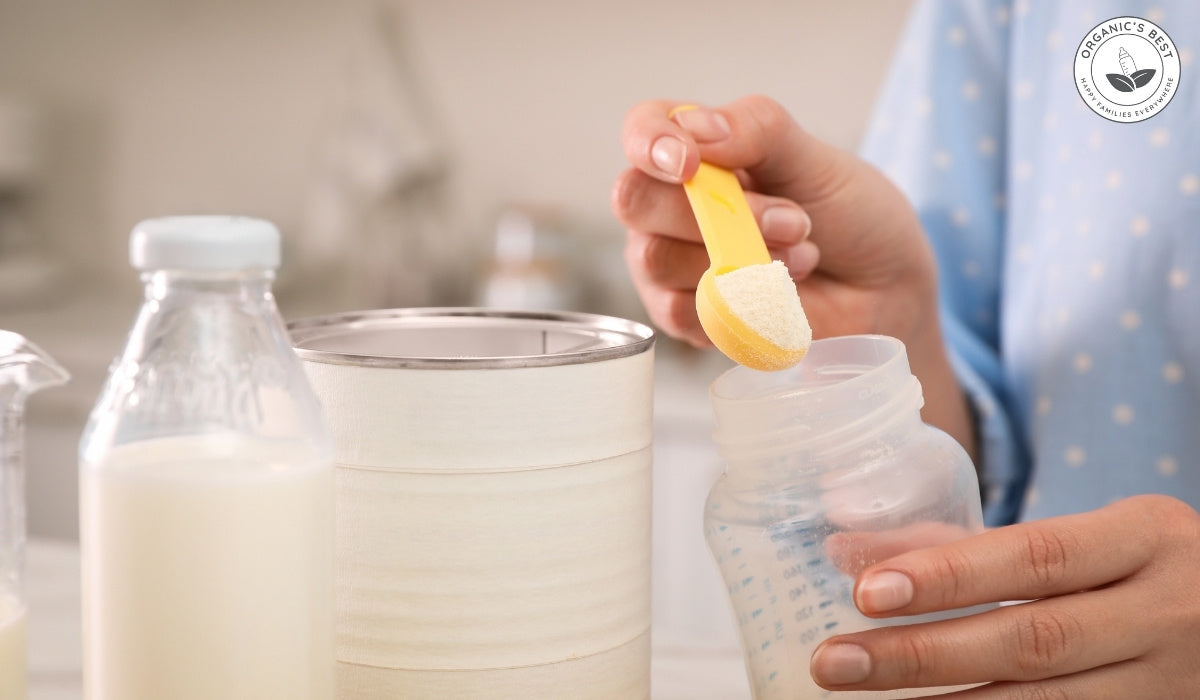Click to Get 2 FREE Boxes/Cans
Click to Get 2 FREE Boxes/Cans
Only New Customers! Click HERE to Get 2 Extra Boxes/Cans for Free With Your First Order.
Only New Customers! Click HERE to Get 2 Extra Boxes/Cans for Free With Your First Order.
BABY FORMULA
Offering new parents top-quality European infant formula from renowned brands like HiPP, Holle, Kendamil, and more. If you’re uncertain about which product to choose, our Formula Finder can help you make the best decision for your baby.
Baby Food
Offering new parents a premium selection of European baby foods, including jars, pouches, cereals, and snacks from esteemed brands like HiPP and Holle.
Can You Mix Formulas Together?
by Agustina Fernandez May 28, 2024 7 min read

A formula feeding journey is rarely straightforward-it's full of trial and error, ups and downs, lots of smiles, and a few frowns. Amidst the planning and chaos, you might find yourself with leftover samples or gifted formulas that you're not sure what to do with.
Alternatively, you may end up travelling without your regular formula brand or being unable to restock your go-to product. Any of these scenarios will likely leave you wondering whether it is safe to mix formula.
In this article, we will answer the question: can you mix formulas? We address potential risks and offer guidance on the best practices to follow to ensure that your baby's feeding journey is a happy and healthy one!
Table of Contents
- Will Mixing Formula Hurt Your Baby?
- Can You Mix Formulas of the Same Brand?
- Can You Mix Two Different Formula Brands Together?
- Can You Mix Two Different Formulas in One Bottle?
- Situations Where Mixing Formulas is Safe
- Specific Scenarios Where Mixing is Discouraged
- How to Safely Mix Different Formulas?
Will Mixing Formula Hurt Your Baby?

The short answer is no; mixing formulas occasionally out of necessity won't harm your baby, as long as the formulas aren't expired and don't contain anything that your baby is allergic or intolerant to.
While it shouldn't be a regular practice, most baby formulas have similar ingredients with only minor differences, so mixing them typically doesn't pose long-term health issues.
However, whether your child relies on a sensitive or standard formula can alter this answer. For example, if your child has health issues that require specialized formulas, such as protein hydrolysate formulas, due to a cow's milk protein allergy, then switching them to standard cow's milk-based formulas would be harmful to their health.
That being said, there are situations where you might be advised to mix formulas temporarily, especially when transitioning from one formula to another. When you switch your baby's formula brand, it's best to gradually wean your baby onto the new baby formula instead of switching formula cold turkey.
If you are introducing your little one to a new formula that they have not yet tried, it is important to monitor them closely to promptly address any health issues that may arise from being introduced to a potential allergen.
While mild tummy troubles like gas and constipation are common with dietary changes, if you notice more severe gastrointestinal symptoms, like blood in stool or forceful vomiting, seek medical attention.
Can You Mix Formulas of the Same Brand?
Formulas from the same brand are likely to contain similar ingredients and nutritional profiles, so it may be better to go this route rather than mixing two different brands.
However, certain brands, like HiPP, offer more than one type of formula with differing milk, including cow's milk, goat's milk and specialty infant formulas. This means that the ingredients and nutritional profiles are quite varied.
In this case, mixing two different types of formula (i.e. cow's milk-based and goat's milk-based) may alter the taste, consistency, and nutrient content while introducing ingredients that may not agree with your baby.
Not only can this lead to gastrointestinal distress, but your little one may not take to the new taste, smell and texture of the mixed formula.
So, if mixing is necessary, you may have more success using the same type of formula from different brands than using different types from the same formula brand.
Can You Mix Two Different Formula Brands Together?
In this context, the type of formula matters more than the brand. Mixing two cow's milk-based formula products together is unlikely to cause issues because their nutritional profiles and ingredient compositions are generally similar.
However, it is important to note that while the main ingredients may be the same, each brand may have slight differences in their formulations, such as variations in added vitamins, minerals, and added nutrients like probiotics and prebiotics. This is especially true when comparing a store-brand version of formula with a more premium infant formula.
On the other hand, mixing very specialized formulas can increase the risk of adverse effects. Specialty formulas are designed to address specific medical or dietary needs, such as hypoallergenic formulas for babies at risk of allergy or formulas for premature infants with higher caloric needs.
Combining these with standard formulas or other specialty formulas can lead to imbalances in nutrition, which might not be suitable for your baby's particular health requirements.
While switching formula brands generally won't harm your baby, some babies might show disinterest or refuse the new formula due to differences in taste or texture. In this case, a gradual introduction can help ease them into the change and help their bodies adjust to the new formula.
This is where mixing in a different formula brand can be useful. For example, you can start by mixing a small amount of the new formula with the current formula and gradually increase the proportion of the new formula over time. This method helps your baby get used to the new taste and reduces the likelihood of digestive upset that could occur if you switch baby formula immediately.
Can You Mix Two Different Formulas in One Bottle?
You should not mix two different baby formulas in one bottle before preparing them. Different infant formulas have specific preparation instructions and nutritional balances that could be disrupted by mixing them. However, you can mix two prepared baby formulas in one bottle after they have been individually prepared according to their respective instructions.
This is especially relevant when dealing with various kinds of formula, including powdered formula, concentrated liquid formula, and ready-to-feed formula. All of these are prepared differently, and trying to add them together before preparing them can disrupt the nutritional composition of each type of formula.
It's crucial to always follow preparation instructions for the formula properly. In particular, you never want to add too little or too much water to a bottle, as over time, this can lead to health complications.
According to the Centers for Disease Control (CDC), too much water can dilute the formula, leading to a reduced nutrient intake, and too little water can put strain on the kidneys and digestive system, leading to dehydration. This is why it is so important to measure your water before adding the liquid concentrated or powdered formula.
If you need to use two different formulas, prepare each one separately according to the instructions. Once they are prepared, then you can combine them into one bottle. This ensures that your baby receives the correct nutrients and avoids any potential issues from improper mixing.
Situations Where Mixing Formulas is Safe
If any of the following scenarios apply to you, then mixing formula may be recommended...

Transitioning Between Formulas: If you switch baby formula, mixing the two differing formulas together can help your baby transition smoothly to the new product. This should be a gradual process, with ratios of each formula adjusted throughout the transition period.
Managing Supply Issues: If you run out of your usual formula and have a similar one on hand, mixing can be a temporary solution until you can restock. This can be especially handy if you have formula samples or gifted products lying around that are not out of date.
Short-Term Needs: For short-term situations, like travel or emergencies, mixing available formulas or temporarily changing formula brands can ensure your baby continues to receive adequate nutrition.
Specific Scenarios Where Mixing is Discouraged
If any of the following scenarios apply to you, it is best to avoid mixing different formulas...

Allergies or Intolerances: If your baby has known allergies or intolerances to specific ingredients, mixing formulas can be more difficult, as you have to ensure that the new product does not contain these ingredients. It's also not recommended to mix different hypoallergenic formulas, as specialty formulas have more unique ingredients.
Medical Conditions: Babies with specific medical conditions or special dietary requirements should not have their formulas mixed unless advised by a healthcare professional. For instance, a baby with CMPA who has been on extensively hydrolyzed formulas to manage reactions cannot digest cow's milk infant formula from a generic store brand.
Specific Caloric Requirements: If your baby requires a precise caloric intake due to growth concerns, mixing formulas can alter the calorie content.
Digestive Issues: If your baby has a sensitive digestive system or suffers from conditions like reflux or colic, mixing formulas might exacerbate these issues.
How to Safely Mix Different Formulas?
If you are planning to mix baby formula, there are a few steps that you should follow. The first, and arguably the most important, is that formulas should be prepared separately before being combined into one bottle if you choose to go that route.
Here are some other safety precautions to take when mixing different formulas.
-
Follow standard safety guidelines for preparing formulas: When mixing formulas, adhere to the standard guidelines for safe preparation. This includes sanitizing equipment and following guidelines for measuring and preparing your specific product. This information can be acquired either on the product label or directly through the manufacturer.
-
Monitor for negative reactions: It is important to closely monitor your baby for any negative reactions to the formula. In most instances, mild reactions like constipation, spit-up, or gas are not a cause for concern. However, symptoms of an allergy, such as hives, vomiting, or wheezing, may indicate a more severe problem, like a cow's milk protein allergy.
-
Gradual transition when switching formula: An immediate change in infant formula may be necessary if your baby has an allergy, intolerance, or medical condition. However, if your baby doesn't have any of these conditions, a slow transition can usually help their tummy adjust more comfortably and reduce the side effects of switching too fast.
Conclusion: Can You Mix Baby Formulas?
A formula-feeding journey is rarely straightforward, so if you find yourself in a sticky situation where mixing formula is necessary, following safety guidelines can ensure that your little one remains happy and healthy. Remember, when in doubt, it is best to consult your pediatrician prior to making any changes to your baby's diet.
|
Disclaimer: Please be aware that this information is based on general trends in babies, and it is not medical advice. Your doctor should be your first source of information and advice when considering any changes to your child's formula and when choosing your child's formula. Always consult your pediatrician before making any decisions about your child's diet or if you notice any changes in your child. Breastfeeding is the best nutrition for your baby because breast milk provides your child with all the essential nutrients they need for growth and development. Please consult your pediatrician if your child requires supplemental feeding. |
Agustina Fernandez
Dr. Agustina Fernandez earned her medical degree from the prestigious Universidad Nacional de Córdoba, Argentina. With a deep-rooted passion for pediatrics, Dr. Fernandez is currently on the path to specializing in children's healthcare. Recently, she has delved into the vital field of infant nutrition. Her research interests include breastfeeding, infant formula, and baby food in little ones’ formative years. Dr. Fernandez's commitment to this area of study underscores her dedication to ensuring the health and well-being of children from their earliest days.
Leave a comment
Comments will be approved before showing up.
Also in Organic Infant Nutrition and Health Blog

10 Winter Activities for Kids and Toddlers
by Agustina Fernandez January 06, 2026 8 min read
Read More
How to Choose The Best Infant Formula: A Guide to EU Organic Formulas
by Agustina Fernandez January 05, 2026 14 min read
Read More
Best Formula for Breastfed Babies 2026 Guide
by Agustina Fernandez January 05, 2026 15 min read
Read More
Reviewed by Dr. Po-Chang Hsu, MD, MS
-

Dr. Po-Chang Hsu: Medical Reviewer of Organic's Best Blog
Dr. Hsu received his medical degree from Tufts University in Boston, Massachusetts, and holds a Master’s of Science degree from both Harvard University and Tufts University.
